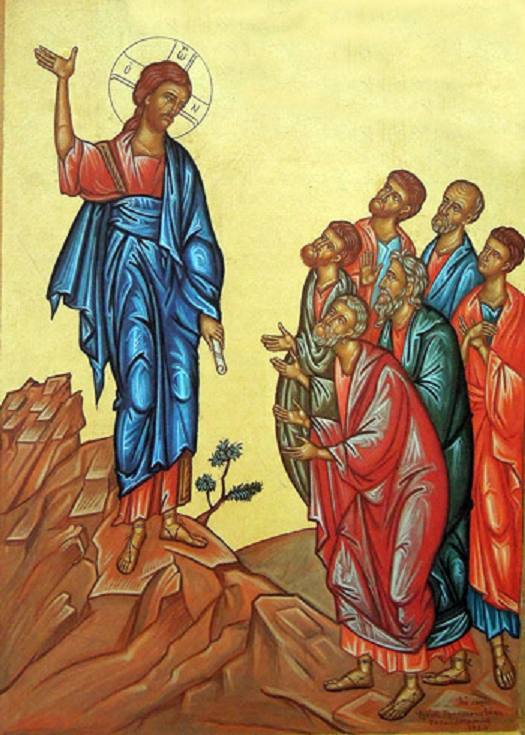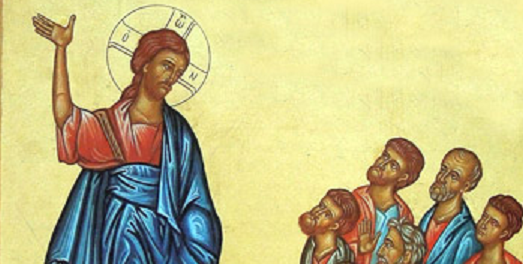Flesh Rising to Spirit
Twenty-First Sunday Scripture Readings

Since today’s gospel passage continues and completes Saint John’s reflections on the Bread of Life that we’ve been reading for the past few weeks, it only makes sense that our consideration of the gospel today should continue with the insights we shared in last week’s homily. We saw then that when Jesus—and by inference, John—spoke of the contrast between the flesh and the spirit, he was referencing the secular world in contrast to the spiritual realm, rather than the concepts of body and soul as the Greek philosophers defined them. This is a critical distinction because, without it, Jesus as the bread of life makes no sense.
Let’s review what Jesus meant by “flesh.” Think of it as the physical dimension. It’s not just the dimension of the material universe and all it contains, it’s, moreover, the dimension of human affairs. It includes our human experiences from birth to death, and, not only that, but it also includes our human plans and dreams, our joys and sorrows, our successes and failures, our togetherness and isolation, our sense of security and all our anxieties. All these are included in what Jesus refers to as the “flesh.” In all these things, the hallmark of the flesh is impermanence. Whatever exists in the world of the flesh, this, too, shall pass.
In a parallel universe, unseen by human eyes, there dwells Permanence. Underlying all the world of the flesh is a Reality consisting of unlimited Being, unlimited Love, and unlimited Life. That is the realm of the Spirit. It is a realm in which we long to exist. Yet, it seems that, like in the parable of the rich man and Lazarus, “a great chasm has been set in place, so that those who want to go from here to you cannot, nor can anyone cross over from there to us.” [Luke 16:26] What could we ever do, left to our own devices in this realm of the flesh to attain limitless Love and limitless Life? Into this conundrum steps Jesus.
Jesus calls himself the bread of life, “living bread come down from heaven.” What on earth is he talking about? If I asked you, “What does bread do for you?” the simplest answer would be that it—and all nourishment—sustains human life. Yet in the world of the flesh, life sustained by bread cannot endure. If our lives are to be sustained beyond the impermanence of this world, that sustenance must come from beyond—that is, from the world of the Spirit. Jesus has a shorthand that he uses to refer to that world of Permanence, that world of the Spirit. He calls it “heaven,” and he calls it the “Kingdom of God.” Jesus presents himself as the meeting-point—the juncture—of the world of the flesh with the world of the Spirit. Access to that world can be gained only by faith—only by believing and trusting in that unlimited Being, that unlimited Love, and that unlimited Life that seems impossible to attain from here within the world of the flesh.
It was not Jesus’s offer of his flesh to eat and his blood to drink that so scandalized his disciples and caused them to abandon the life with him that they had previously embraced. What upset them was his claim to have come to the world of the flesh from that impossibly distant world of the Spirit. For many, that was a bridge too far. Their fleshly senses—their eyes, their ears, their touch—all recognized Jesus as a known quantity, an inhabitant of their accustomed world of the flesh. How could he claim his origins also in that other, alien, and unattainable world of the Spirit? And, beyond that, how could he claim to be the sustenance that would transform life in the world of the flesh into Life in the world of the Spirit?
Here we find a very serious life-lesson. The transition from life in the world of the flesh to Life in the world of the Spirit demands that we cross the bridge called “faith,” not in the sense of assent, but faith that manifests itself in radical trust. And that trust will be tested. After all, what sense does trust have if there are no challenges? What kind of fortitude does it take to drift downhill? “As a result of this, many of his disciples returned to their former way of life”—life in the world of the flesh—“and no longer accompanied him.”
At that, Jesus turned “… and said to the Twelve, ‘Do you also want to leave?’” Because the temptation to give up is always there. The world of the flesh, the world of our common experience, will never stop throwing up its litany of discouragements, telling us that the promises of the world of the Spirit are illusory and unachievable and impossible. It presents us with proof after proof that life is absurd, purposeless, frustrating, and futile. There will be times when we will want to abandon our trust in unlimited Love, unlimited Life, and an all-powerful God. We’ll tire of always finding that no good deed goes unpunished. The temptation is strong to give in to the MAGA belief that I’m going to get mine regardless of the consequences, so you’re on your own, and that is the only logical way to live.
At those times, when the world of the Spirit—the world of unlimited Love and Life—seems to be an impossible dream, it’s then that Jesus will turn to you in the voice that comes from the depths of your own spirit, and he’ll say to you, too, “Do you also want to leave?” When these words come to you, I pray that you will be able to answer him as Peter did. “Master, to whom shall we go?” Not because we’re out of options—because, after all, the world of the flesh provides endless options—but because we know in our souls that, Lord, “You have the words of eternal life.”
Get articles from H. Les Brown delivered to your email inbox.
